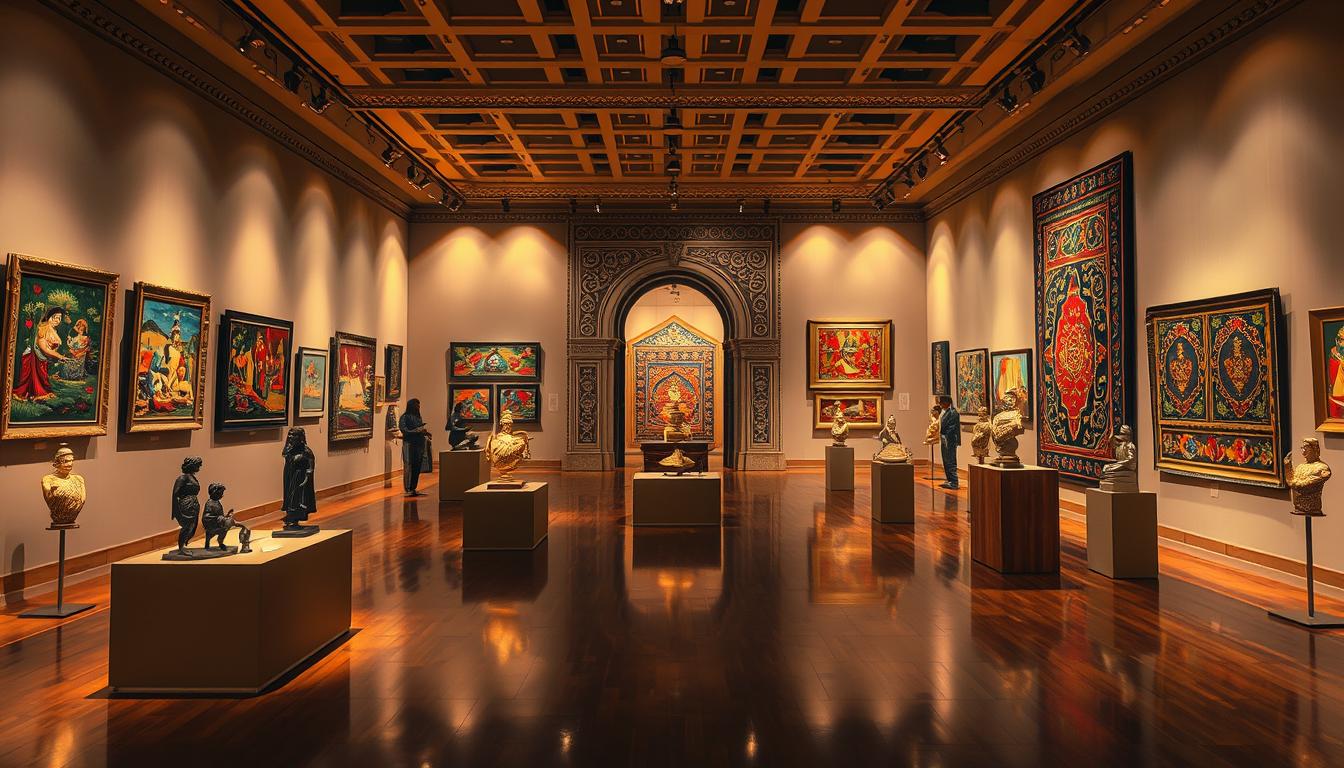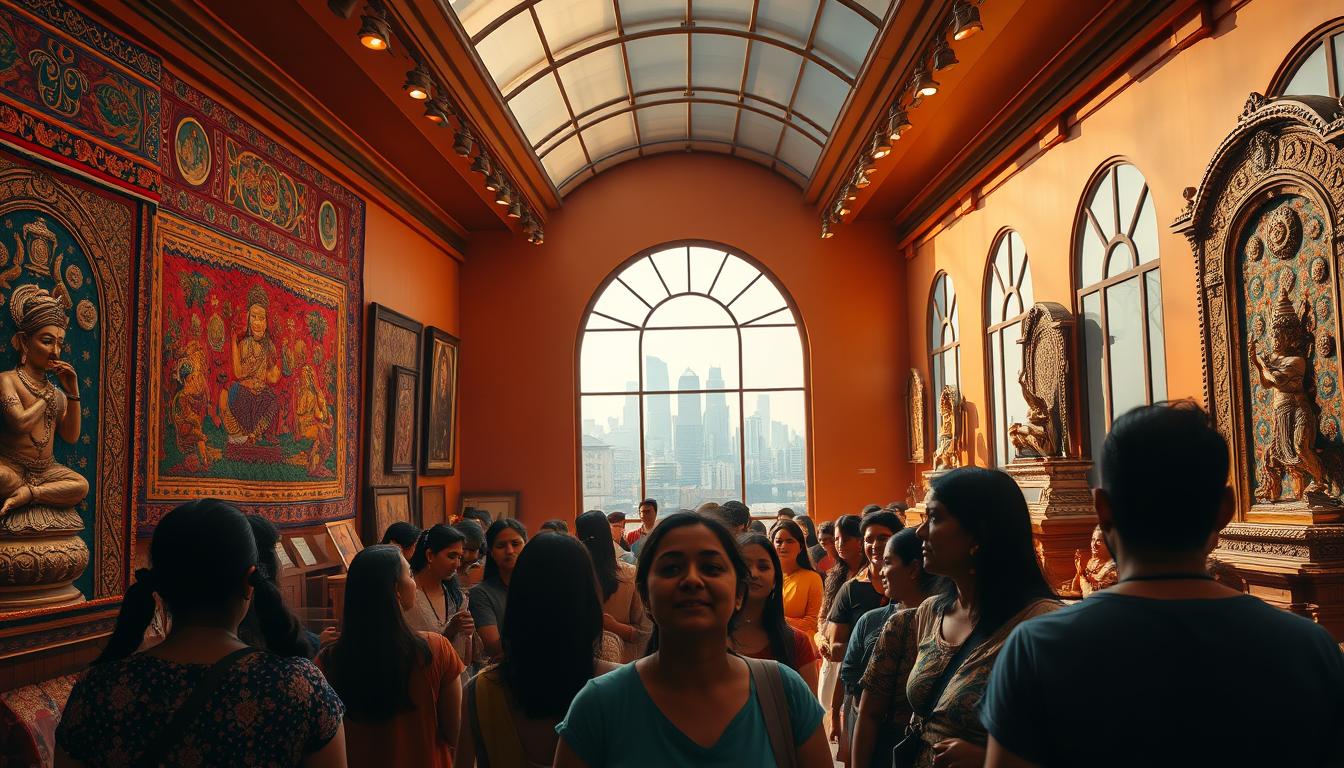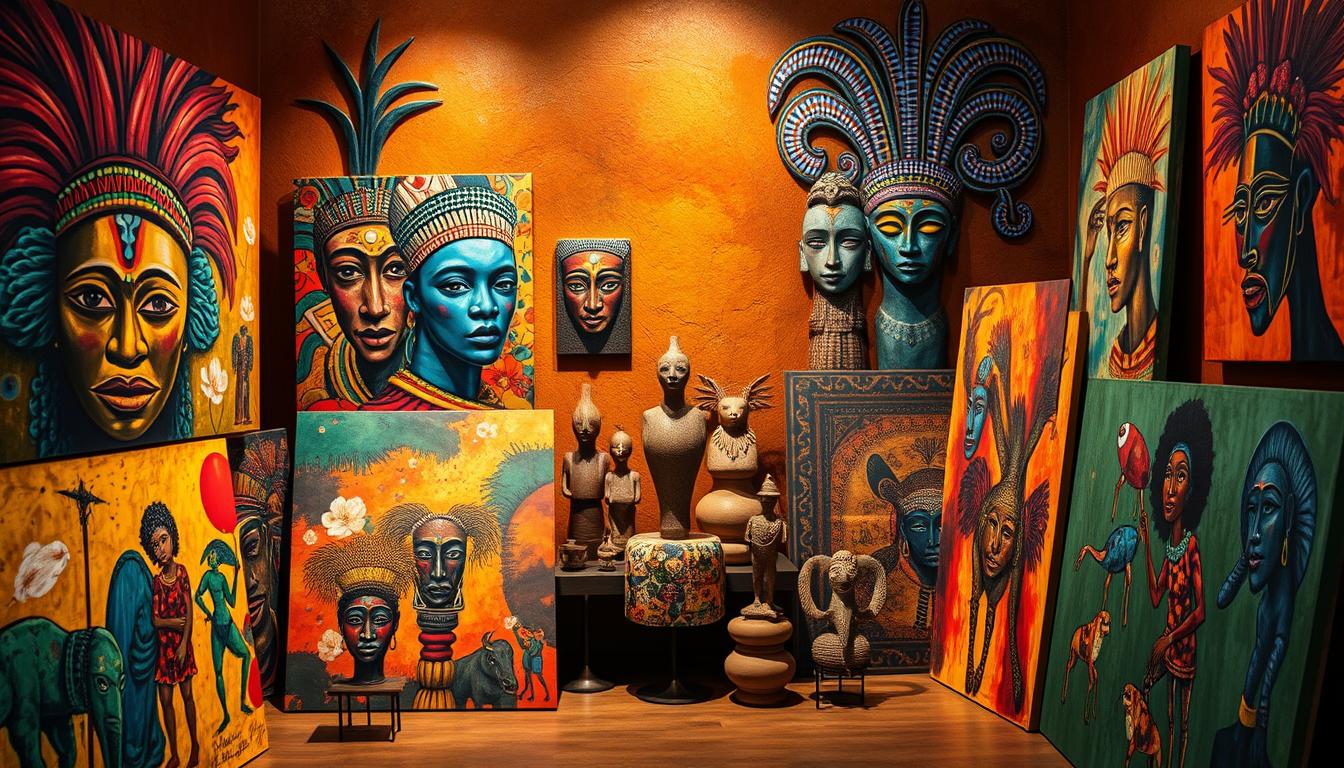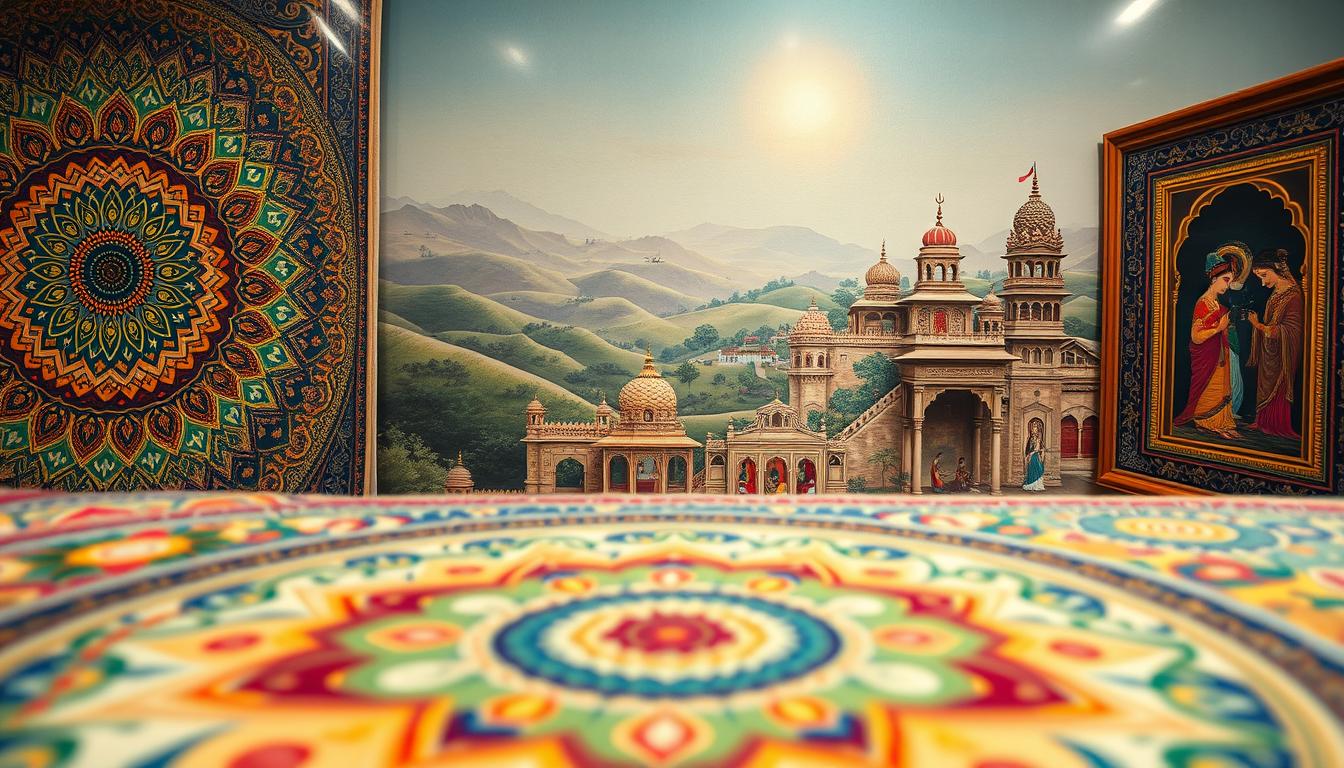I’ve spent my life connecting cultures through art. Our Indian art gallery is more than just a place to see art. It’s a journey through generations of creativity and culture.
Entering our gallery is like stepping into a living painting. Each piece has its own story, showing India’s rich culture. You’ll see everything from Madhubani paintings to modern sculptures.
Our gallery shows that art knows no bounds. Every artwork has centuries of history, spiritual depth, and cultural importance. Whether you’re an art lover or new to it, our gallery offers a memorable experience.
Key Takeaways
- Discover authentic Indian art from various historical periods
- Experience a diverse range of artistic styles and techniques
- Explore artworks that connect tradition with contemporary expression
- Learn about the cultural significance behind each masterpiece
- Engage with art that tells powerful stories of Indian heritage
Introduction to Indian Art
Indian art is a colorful mix of culture that has amazed people for thousands of years. It’s a window into the deep heritage of the subcontinent. It takes us on a journey through time, color, and spiritual depth.
The history of Indian art is complex but full of meaning. Each piece of art tells a story that goes beyond its beauty. It connects us to ancient traditions and deep cultural stories.
What Defines Indian Art?
Several key traits make traditional Indian art stand out:
- Deep spiritual symbols
- Stories told through visuals
- Bright colors that show off nature
- Strong ties to religious beliefs
The Evolution of Indian Art Styles
Indian art has changed a lot over time. From ancient rock paintings in Bhimbetka to the detailed sculptures of the Gupta period, each era brought new art forms.
Art is not just a visual representation, but a language that communicates the soul of a civilization.
The history of Indian art shows amazing changes, like:
- Prehistoric rock art showing everyday life
- Indus Valley Civilization’s advanced pottery
- Buddhist and Hindu art influences
- Greco-Buddhist art during the Kushan Empire
By looking into these art traditions, we learn about the rich cultural fabric of India. It shows how Indian art has evolved over millennia.
The Rich History of Indian Art
Indian art history goes back thousands of years. It shows a complex mix of cultural expression that has grown over time. Each era has brought its own views and methods to the rich world of art.
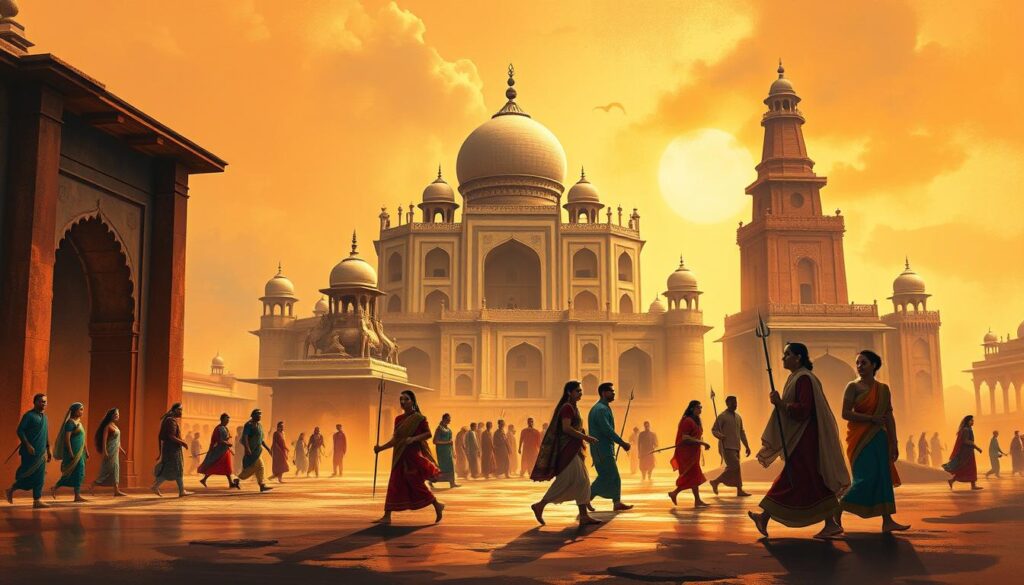
The story of Indian art starts with amazing prehistoric achievements. At the Bhimbetka rock shelters, archaeologists found rock art from 10,000 years ago. These early works give us deep insights into human creativity and cultural growth.
Ancient Civilizations and Artistic Foundations
Many important historical periods have shaped Indian art history:
- Indus Valley Civilization (c. 3300–1750 BCE): Made advanced terracotta figurines
- Mauryan Empire (c. 322–185 BCE): Created famous sculptural works like the Lion Capital
- Shunga Dynasty (c. 185–72 BCE): Brought about extensive Buddhist architectural traditions
Spiritual and Cultural Influences
Religious and spiritual themes deeply influenced art. Buddhist and Hindu traditions inspired detailed sculptures, paintings, and architectural wonders. These works amaze people all over the world.
Art in India has always been more than visual representation—it’s a narrative of cultural identity and spiritual exploration.
The mix of old techniques and new ideas keeps Indian art alive and changing. It continues to be a powerful way of sharing culture and ideas.
Prominent Art Forms in India
India’s art scene is full of color and creativity. It shows a wide range of traditional art that spans centuries. From detailed paintings to expressive sculptures, each piece tells a story of culture and innovation.
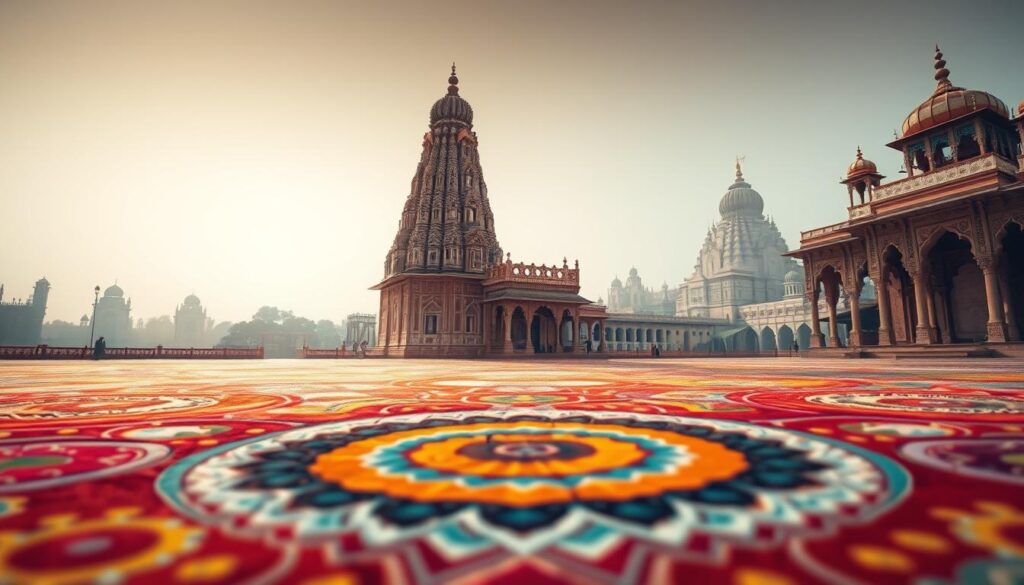
I’ll take you through the amazing world of Indian art. We’ll explore the rich traditions that have shaped this incredible heritage.
Traditional Painting Styles
Traditional Indian art includes many stunning painting techniques. Each region has its own style, making a beautiful mosaic of art. Let’s look at some of the most impressive styles:
- Madhubani: Vibrant paintings from Bihar showing mythological scenes
- Tanjore: Elaborate paintings with gold leaf and rich
- Miniature: Tiny paintings with lots of details
- Warli: Tribal art showing daily life and nature
Sculpture and Carvings
Indian sculptural traditions are another highlight of art. Stone, wood, and metal are used to create detailed artworks. These pieces tell stories of spirituality and culture.
Decorative Arts
Traditional Indian art also includes textiles, pottery, and metalwork. Kalamkari textiles from Andhra Pradesh and wood carvings from Meghalaya show India’s amazing craftsmanship.
“Art is not what you see, but what you make others see.” – Edgar Degas
Each art form is a window into India’s rich culture. It invites viewers to see the depth and complexity of traditional Indian art.
Celebrated Indian Artists to Know
The world of contemporary Indian artists is full of creativity and passion. It’s a mix of legendary masters and new talents. Indian art is known for its unique style and deep stories.
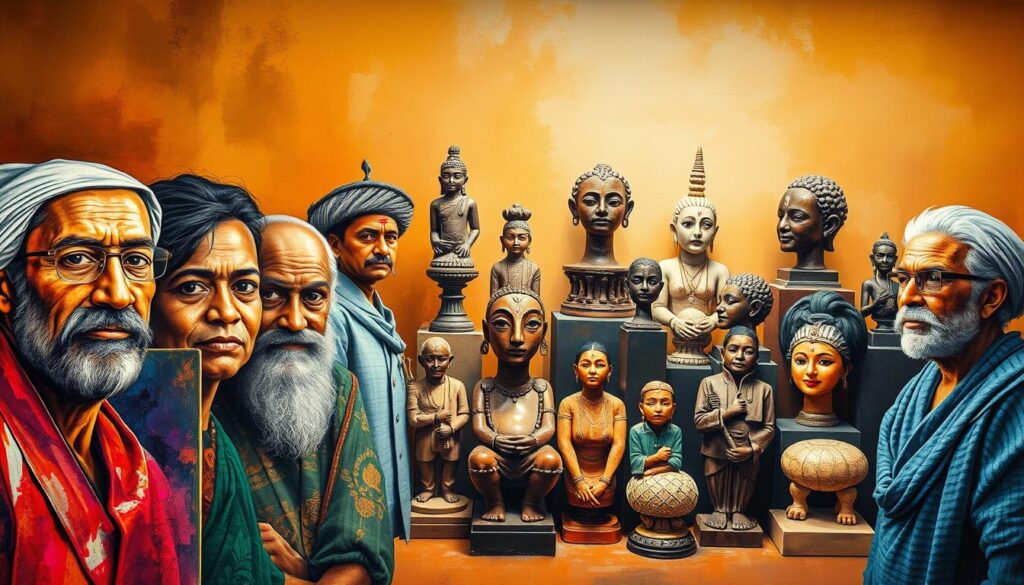
Exploring Indian art, I found amazing artists who have changed the scene. Looking at contemporary Indian artists shows a wide range of talent and new ideas.
Modern Masters of Indian Art
India’s modern art scene has incredible talents who changed how art is seen:
- M.F. Husain: Known for bold, provocative themes
- S.H. Raza: Celebrated for geometric shapes and vibrant colors
- Tyeb Mehta: Pioneered abstract art with powerful visual narratives
Emerging Talents in the Art Scene
A new generation of artists is bringing fresh ideas and new techniques. Young artists like Nilisha Phad and Ekta Sharma are making waves globally. They have unique voices in art.
Art is not just about technique, but about capturing the soul of human experience.
These new talents show the exciting future of Indian art. They mix old traditions with new ideas.
Themes and Motifs in Indian Art
Traditional Indian art is a vibrant tapestry of deep meanings and cultural expressions. Each brushstroke and sculpture tells a story. These stories are rooted in spirituality, nature, and human experience. Exploring these artistic traditions shows a rich landscape of visual storytelling.
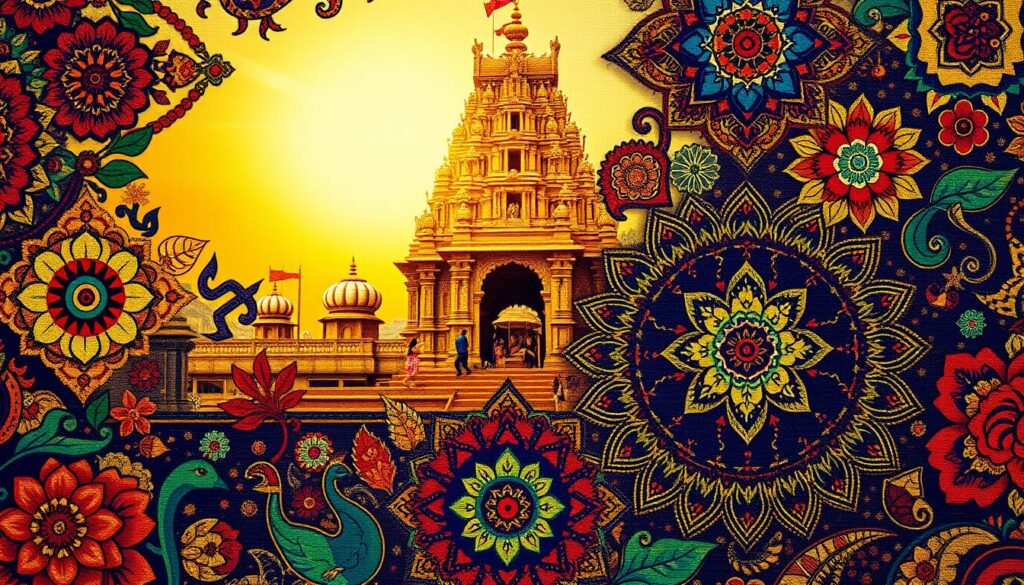
The themes in traditional Indian art show a complex mix of cultural stories. Let me take you through the most important motifs:
- Spiritual Representations
- Mythological scenes from Ramayana and Mahabharata
- Depictions of Hindu deities like Lord Ganesha
- Religious narratives captured in detailed paintings
- Nature and Landscape
- Rural village scenes
- Farming and daily life activities
- Geometric representations of natural environments
Spiritual Symbolism in Art
Indian art forms like Madhubani and Pattachitra are windows into spiritual consciousness. They use vibrant colors and patterns to tell divine stories. Tanjore paintings, with their rich gold leaf, show the divine reverence in traditional Indian art.
Landscape and Cultural Narratives
Warli art and landscape paintings show the essence of rural life. Artists like Sumanto Chowdhury create stunning scenes of hills and villages. They preserve cultural memories through visual storytelling. Traditional Indian art is a powerful way to preserve and express culture.
“In every stroke of traditional Indian art, there lies a universe of meaning waiting to be discovered.” – Anonymous Artist
Indian Art’s Global Influence
The world of contemporary Indian artists has changed fast. They’ve moved from local to global fame. This change started in the 1990s. Indian art now reaches people worldwide with new ideas and stories.
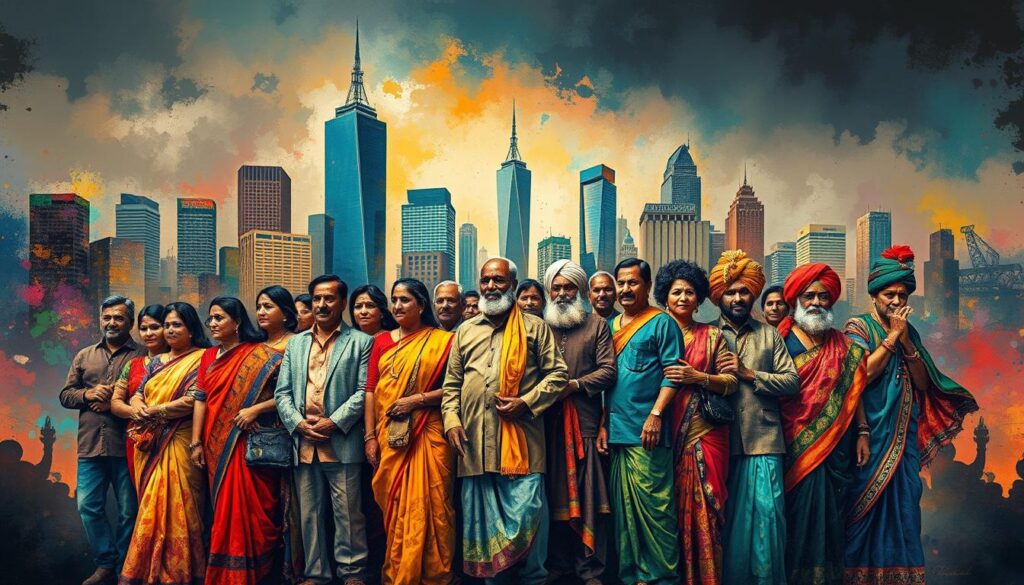
Today, Indian artists are changing art globally. They mix old techniques with new views. Their work talks to everyone, not just one culture.
Reshaping Global Art Trends
Indian art is getting noticed more around the world. Here are some big changes:
- Major international exhibitions showcase Indian talent.
- More people worldwide want to buy Indian art.
- Indian and international artists are working together.
Cross-Cultural Artistic Collaborations
Artists like Subodh Gupta and Jitish Kallat are famous globally. They create art about moving, identity, and connecting with others.
Indian art is no longer just about showing who we are. It’s about talking to the world and sharing our experiences.
The India Art Fair and new places like Artix help more people see Indian art. They make it easier for art from India to be shared and loved.
Selecting Art for Your Collection
Exploring Indian art for sale is thrilling. It’s more than just buying beautiful pieces. It’s about finding art that touches your heart.
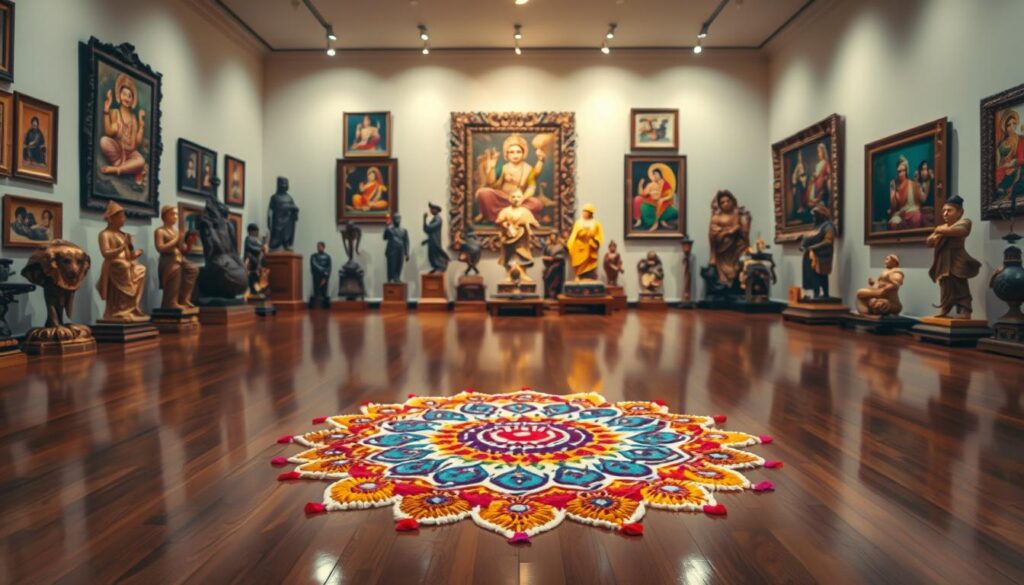
- Know what you like
- Learn about the artist’s story
- Feel the art’s emotional and visual power
- Think about its value as an investment
Choosing the Perfect Artwork
First, decide what style you prefer. Do you like traditional paintings or modern abstracts? Visit exhibitions, museums, and talks to learn about Indian art’s history.
Understanding Art Valuation
Don’t just look at the price. Important factors include:
- The artist’s fame and skills
- The art’s historical importance
- How hard it was to make
- Its history and documents
Remember, the best art collection shows your unique personality and experiences.
Pro tip: See the art in your home before buying. This ensures it fits your space and feels right to you.
Visiting Our Indian Art Gallery
Art lovers and culture enthusiasts, get ready for an immersive journey into the world of Indian art! Our Indian art gallery offers a unique chance to explore India’s vibrant and diverse artistic landscape. It’s right in the heart of the city.
Planning your visit to our Indian art gallery is an exciting adventure. We’ve designed our space to provide an enriching and accessible experience for every art enthusiast. Let me guide you through what you can expect during your exploration.
Location and Accessibility
We’re conveniently situated in a prime location, making your visit smooth and enjoyable. Our gallery is easily accessible by various modes of transportation:
- Centrally located in downtown area
- Close to public transit routes
- Ample parking available nearby
- Wheelchair-friendly entrance
Gallery Layout and Highlights
Step into our carefully curated Indian art exhibition spaces that showcase the rich artistic heritage of India. Our gallery features:
- Contemporary Art Section: Featuring works by emerging and established artists
- Traditional Art Gallery: Displaying classic Indian art forms
- Interactive Multimedia Zones: Providing deeper insights into artistic techniques
Whether you’re an art collector, a student, or simply curious about Indian art, our gallery promises an unforgettable experience. It connects you with the soul of Indian creativity.
Upcoming Exhibitions and Events
Get ready to dive into the vibrant world of Indian art. Our gallery is excited to show you a wide range of artistic expressions. These will take you on a journey through both contemporary and traditional Indian art.
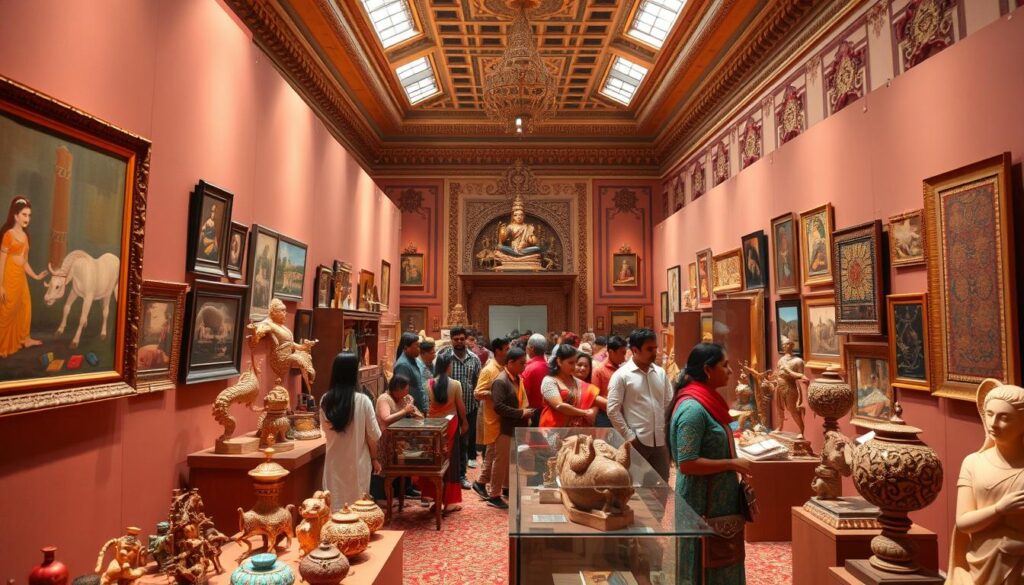
I’m excited to share our upcoming exhibitions. They celebrate the rich creativity of Indian art. Here are some events you won’t want to miss:
Featured Artists Showcase
- Emerging Talents Exhibition: Discover breakthrough Indian artists pushing creative boundaries
- Contemporary Visions: A curated collection of modern Indian artistic interpretations
- Traditional Roots: Exploring classical Indian art forms through contemporary lenses
Special Events and Openings
Mark your calendars for these exciting events:
- Artist Meet-and-Greet Sessions
- Curator-led Gallery Tours
- Interactive Art Workshops
- Live Artistic Demonstrations
I invite you to join us and explore the dynamic world of Indian art. Each exhibition offers a unique window into artistic expression. It connects cultures and sparks imagination.
Engaging with Indian Art
Art is more than just looking at it—it’s an experience that connects us all. In our gallery, we aim to create meaningful interactions. These go beyond just looking at Indian art online.
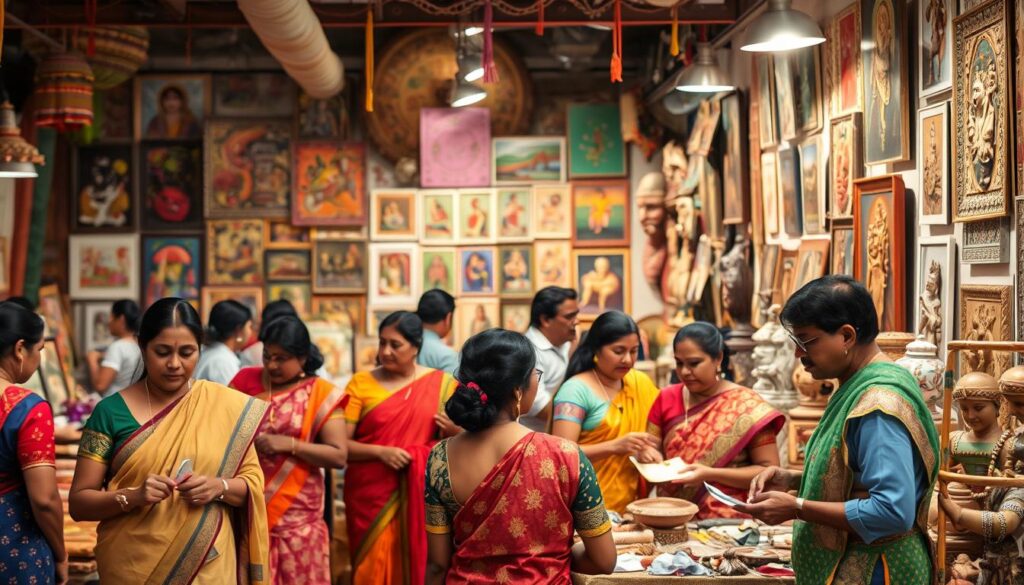
We’re dedicated to Indian art online through dynamic programs. These programs are designed to immerse you in creative experiences. We offer a range of opportunities for art lovers of all levels to explore the vibrant world of art.
Art Workshops and Learning Opportunities
Discover the magic of traditional and contemporary Indian art techniques in our workshops:
- Traditional Madhubani painting classes
- Contemporary digital art techniques
- Sculpture and ceramic workshops
- Photography and mixed media sessions
Community Involvement Through Art
We’re passionate about building connections through art. Our community programs focus on:
- Collaborative art projects
- Local school partnership initiatives
- Cultural exchange programs
- Public art installations
Whether you’re new to art or have lots of experience, our programs welcome you. Explore, learn, and create within the rich world of Indian art online.
“Art is not just about creating beauty, but about building understanding between people and cultures.”
The Role of Technology in Indian Art
Technology is changing how we see and interact with Indian art online. As someone who loves art, I’ve seen a big change. Now, artists can create, share, and sell their work in new ways.
The digital world has opened new doors for Indian artists. They can now show their work to people all over the world. We’ve seen some big changes because of technology:
- Virtual gallery tours that bring art right to your screen
- Augmented reality experiences that let you see art in your own space
- Digital platforms that connect artists with collectors from everywhere
Digital Platforms Empowering Artists
Online platforms have changed the game for Indian art online. Artists use digital tools to:
- Make new kinds of digital art
- Connect with people all over the world instantly
- Keep traditional art alive by documenting it digitally
Virtual Art Experiences Transforming Engagement
Technologies like AR and VR are changing how we interact with art. Imagine looking at art details from your living room, or exploring cultural stories in interactive digital shows.
Technology isn’t replacing art—it’s making it bigger and more accessible.
The Indian art market is worth $700 million. This shows how technology and traditional art can work together. Digital innovations are not just changing how we see art. They’re creating new kinds of artistic experiences.
Conclusion: Your Journey into Indian Art
Exploring Indian art has been a thrilling adventure. It’s filled with bright colors, deep traditions, and fresh ideas. An Indian art gallery is more than just pretty pictures. It’s a deep conversation about culture.
Online platforms have changed how we see art. Artists like Harshit Agrawal and Raghava KK mix old and new styles. Their work shows how Indian art speaks to people everywhere.
You can start your Indian art journey anytime. Visit museums, check out online collections, or meet local artists. Places like the Kochi-Muziris Biennale and India Art Fair showcase new talent. Each piece of art tells a story of culture and creativity.
Art is about more than just looking. It’s about feeling a connection. As you dive deeper into Indian art, you’ll find layers of meaning and emotion. Your adventure is just starting.
Source Links
- https://www.masterpieceonline.com/buy-indian-traditional-art-paintings-online-in-usa/?srsltid=AfmBOoquPkLejZxeWtsM8n5FxN2v7491xx6XVxXY6b1pgnPCbkrm9yAi – Buy Original Indian Traditional Art Online, Buy Indian Paintings In USA
- https://www.art4you.gallery/en/contemporary-art/find-linformation-on-laart/history-of-lart-of-prehistory-to-the-present-day/asian-laart-in-ancient-history-a-spiritual-and-cultural-richness/indian-lart-an-epic-travel-through-the-ages – Indian art: an epic journey through ages – Art4you Gallery
- https://blog.mojarto.com/indian-artistry-10-distinct-types-of-paintings-in-india/ – Indian Artistry: 10 Distinct Types of Paintings In India – Art Blogs & Videos | Learn Art Investment | Explore, Experience Art
- https://www.bia.gov/as-ia/opa/online-press-release/around-world-indian-art – Around the World with Indian Art
- https://new.artsmia.org/learning-resources/teaching-the-arts/tta/five-facts/indian-art/ – No title found
- https://en.wikipedia.org/wiki/Indian_art – Indian art
- https://blog.artlounge.in/blog/2021/8/30/indian-art-forms – Indian Art Forms — Art Lounge
- https://timesofindia.indiatimes.com/life-style/the-arts/10-famous-indian-painters-you-should-know-about/photostory/104398773.cms – 10 famous Indian painters you should know about
- https://www.artflute.com/artists?srsltid=AfmBOoqimHTS7P6_SLN4I07b93tEQzFuKIpyX8WZyr3t5Ww8AdA2bNy7 – Famous Indian Artists & Contemporary Painters Online
- https://blog.mojarto.com/10-emerging-indian-artists-on-mojarto/ – 10 Emerging Indian Artists On Mojarto – Art Blogs & Videos | Learn Art Investment | Explore, Experience Art
- https://laasyaart.com/types-indian-paintings-with-different-styles-themes/ – Types of Indian Paintings: Different Styles, Themes That Describe Indian Art – Laasya Art
- https://www.visionsarts.com/traditional-indian-art/ – Exploring Diverse Techniques in Traditional Indian Art and Their Museums of Magnificence – Visions Art
- https://mapacademy.io/article/globalisation-and-indian-art/ – Globalisation and Indian Art – MAP Academy
- https://charumaithani.net/texts/consciousness-of-indian-art-in-the-global-contemporary/ – Consciousness of Indian art in the global contemporary
- https://www.artsy.net/article/artsy-editorial-india-s-art-market-thriving-here-s – India’s Art Market Is Thriving—Here’s Why
- https://laasyaart.com/art-buying-tips/ – Tips on How to Buy Indian Art at a Gallery or Online – Laasya Art
- https://www.architecturaldigest.in/story/art-novice-here-are-7-expert-tips-on-how-to-build-an-art-collection-interior-designers-in-india/ – Art novice? Here are 7 expert tips on how to build an art collection
- https://laasyaart.com/indian-contemporary-art-museums-gallery-fairs-new-york/ – Indian Art Museums and Galleries in New York, New York: Places to Visit for Art Lovers – Laasya Art
- https://www.gallerienvya.com/art-gallery/top-reasons-visit-indian-art-gallery/ – Top Reasons to Visit an Indian art gallery
- https://contemporarylynx.co.uk/11-contemporary-art-galleries-in-india – 11 contemporary art galleries in India. | Contemporary Lynx – print and online magazine on art & visual culture
- https://indianartsandculture.org/current – Current Exhibitions | Museum of Indian Arts & Culture
- https://iaia.edu/iaia-museum-of-contemporary-native-arts/ – IAIA Museum of Contemporary Native Arts (MoCNA)
- https://www.galleriesplash.com/site/blogsview?id=23 – Leading Indian Art Gallery with over two decades of trust | Gurgaon
- https://www.viewfinderr.com/index.php?route=information/tt_blog&tt_blog_id=14 – A Journey Through Culture and Values
- https://www.harpersbazaar.in/culture/story/six-patrons-of-art-let-us-in-on-how-the-women-view-the-future-of-art-942981-2024-04-01 – Six patrons of art let us in on how women view the future of the industry
- https://builtin.com/articles/India-tech-and-art – Tech and Art in India | Built In
- https://www.poojn.in/post/21447/indian-art-and-technology-a-new-cultural-dialogue?srsltid=AfmBOoqRCow1KCn2zXkOHEetUVL_FcUL2Yk239OCRREsyXZjLd3pO_Ij – Indian Art and Technology: A New Cultural Dialogue – India’s Biggest Dashakarma Bhandar | Poojn.in
- https://nowform.co/all/research/feeding-indias-appetite-for-accessible-art-a-digital-transformation-opportunity/ – India’s Appetite for Accessible Art: A Digital Transformation Opportunity – Now Form
- https://explore.yatraehind.com/art-and-culture/modern-indian-art-forms-conclusion/ – Modern Indian Art Forms – Conclusion | Yatra – e – Hind
- https://thehaatofart.com/national-gallery-of-modern-art/ – A Journey Through Indian Art – TheHaatofArt
